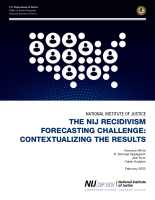Parole supervision
Evaluating Intensive Supervision Probation/Parole: Results of a Nationwide Experiment
Assessing the Impact of a County Operated Boot Camp: Evaluation of the Los Angeles County Regimented Inmate Diversion Program
Reexamining the Effects of Probation and Parole on Narcotics Addiction and Property Crime
New Orleans Offender Study: Phase 1, Volume 1: Description of Official Record Data and Coding Process
Maine Rejects Indeterminacy - A Case Study of Flat Sentencing and Parole Abolition
"I Feel Like I'm Always on Edge": Perceptions of Parole Supervision by Parolees with Substance Use Disorders
Conceptualizing the Personal Touch Experiential Knowledge and Gendered Strategies in Community Supervision Work
Home Visits in Community Supervision: A Qualitative Analysis of Theme and Tone
Monitoring Technologies for Community Supervision
Location Tracking Systems for Community Supervision
Alcohol and Drug Monitoring for Community Supervision
NIJ Recidivism Forecasting Challenge Report for Team PASDA
CATBOOST Models for the Recidivism Forecasting Challenge
National Institute of Justice's Recidivism Forecasting Challenge: Research Paper, Group MNLB
Recidivism Forecasting Challenge
Partnerships for Public Safety
Justice Atlas of Sentencing and Corrections
Implementing the Next Generation of Parole Supervision: Findings from the Changing Attitudes and Motivation in Parolees Pilot Study
The NIJ Recidivism Forecasting Challenge: Contextualizing the Results
Desistance From Crime: Implications for Research, Policy, and Practice
Most scholars would agree that desistance from crime – the process of ceasing engagement in criminal activities – is normative. However, there is variability in the literature regarding the definition and measurement of desistance, the signals of desistance, the age at which desistance begins, and the underlying mechanisms that lead to desistance. Even with considerable advances in the theoretical understanding of desistance from crime, there remain critical gaps between research and the application of that research to practice.
See the YouTube Terms of Service and Google Privacy Policy








